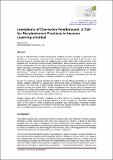Files in this item
Limitations of corrective feedforward : a call for resubmission practices to become learning-oriented
Item metadata
| dc.contributor.author | Carver, Mark | |
| dc.date.accessioned | 2018-03-22T16:30:05Z | |
| dc.date.available | 2018-03-22T16:30:05Z | |
| dc.date.issued | 2017-07-14 | |
| dc.identifier | 252297101 | |
| dc.identifier | 54aef51b-b617-494d-b886-8d7c01bd1ef1 | |
| dc.identifier.citation | Carver , M 2017 , ' Limitations of corrective feedforward : a call for resubmission practices to become learning-oriented ' , Journal of Academic Writing , vol. 7 , no. 1 . https://doi.org/10.18552/joaw.v7i1.237 | en |
| dc.identifier.issn | 2225-8973 | |
| dc.identifier.other | ORCID: /0000-0003-4393-8915/work/41757196 | |
| dc.identifier.uri | https://hdl.handle.net/10023/12998 | |
| dc.description.abstract | As part of well-planned formative assessment, feedback can help students to understand the demands of a summative assessment task, evaluate their current level of performance, and then find ways to close the gap. As students take a more active role in this process, their feedback can be thought of as becoming ‘feedforward’ since it serves a specific purpose and drives student action. As the value of formative assessment design is becoming emphasised in higher education, summative assessment practices need to be re-evaluated in terms of how well they support learning as opposed to just supporting valid judgements of student performance. However, despite significant discussion of Assessment for Learning and Learning-Oriented Assessment, resubmission practices are largely overlooked even though resubmission can be a key event in whether students are retained. As part of a learning support department’s effort to provide effective feedback on academic writing, students referred for support were offered two types of feedback: one was simple correction, the other was in-depth dialogic feedback which followed “feedback for learning” guidance (Askew and Lodge 2000). Student engagement with the two types of feedback was analysed by looking at the changes students made to their work and feedback from their subject tutor (including the resubmission grade). The tutor’s feedback was also analysed to see if any intentions for the resubmission task could be inferred. Results suggest that corrective feedback is highly efficient in enabling students to pass resubmissions and that more in-depth feedback is much less efficient. This paper highlights some of the ways in which resubmission practices can unknowingly encourage surface approaches, and suggests some ideas for how learning support can better align with subject tutors to enable resubmission to become more learning-oriented. | |
| dc.format.extent | 15 | |
| dc.format.extent | 578531 | |
| dc.language.iso | eng | |
| dc.relation.ispartof | Journal of Academic Writing | en |
| dc.subject | Reassessment | en |
| dc.subject | Resubmission | en |
| dc.subject | Proofreading | en |
| dc.subject | Feedback | en |
| dc.subject | Feedforward | en |
| dc.subject | Writing support | en |
| dc.subject | Academic writing | en |
| dc.subject | LB Theory and practice of education | en |
| dc.subject | NDAS | en |
| dc.subject.lcc | LB | en |
| dc.title | Limitations of corrective feedforward : a call for resubmission practices to become learning-oriented | en |
| dc.type | Journal article | en |
| dc.contributor.institution | University of St Andrews. University of St Andrews | en |
| dc.contributor.institution | University of St Andrews. International Education Institute | en |
| dc.identifier.doi | https://doi.org/10.18552/joaw.v7i1.237 | |
| dc.description.status | Peer reviewed | en |
This item appears in the following Collection(s)
Items in the St Andrews Research Repository are protected by copyright, with all rights reserved, unless otherwise indicated.

